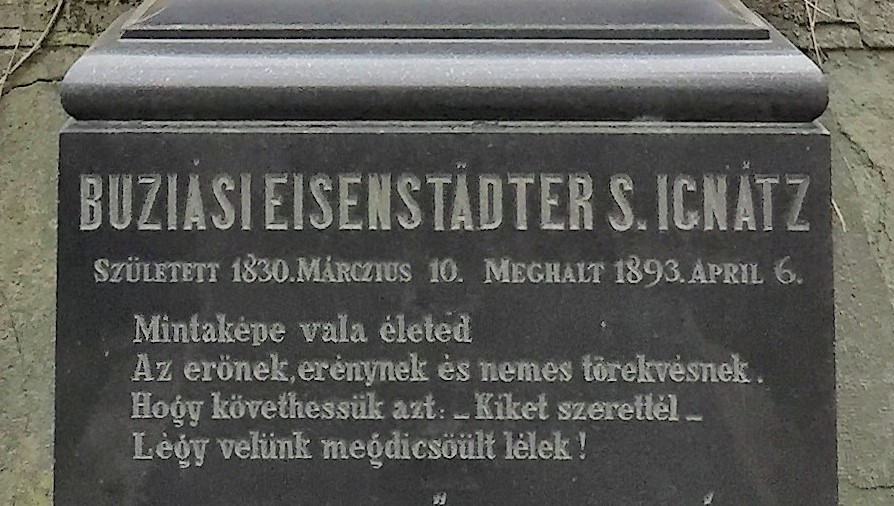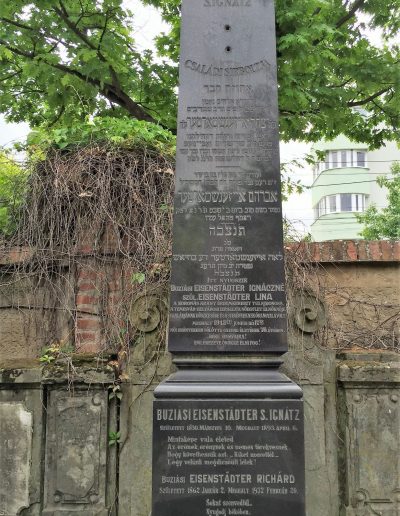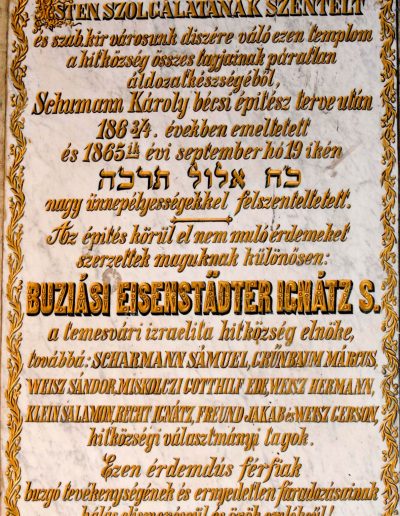Ignátz Eisenstädter S. de Buziaş
March 10, 1830, Nagybecskerek / Grossbecskerek, Habsburg Empire, today Zrenjanin, Serbia - April 6, 1893, Temesvár, Austro-Hungarian MonarchyIndustrialist, businessman and patron. President of the Jewish Community in the Citadel
He inherited the noble title “Buziási” from his father, Simon Eisenstädter (1796-1875, Vienna), a great merchant from Becicherecul Mare, ennobled on May 2, 1872. Ignátz studied commerce. He enlisted in the Honvez army and participated in the revolution of 1848-1849, being promoted to sergeant major, then lieutenant and, finally, lieutenant major of Honvez. In 1854 in Timisoara, he collaborated in the wholesale manufacturing enterprise, founded by his uncle in 1809. In 1855, he became the head of the wholesale trade enterprise Eisenstädter.
In 1863 he was elected vice-president, and in 1876, president of the Chamber of Commerce and Industry of Timisoara. He was the director of the Timisoara branch of the National Bank of Austria. He has been president of the Lloyd's Society since its founding in 1865 for 28 years. Also in 1865, he became a member of the body of representatives of the free royal city of Timisoara. In 1866, as a former lieutenant major, he was elected a member of the Honvez Help Society in Timis County. The construction of the Timişoara-Orşova railway is linked to his name, as well as the establishment of numerous enterprises and mechanical mills. He contributed to the construction of the Franz Joseph Theater in Timişoara by buying a large number of shares. He supported the publication of Temesi Lapok, founded in 1872. In 1872, the citizens of the Citadel elected him to the first municipal council.
Also in 1872 the king granted him the noble title of Buziási (of Buziaş).
In 1868 he represented Jewishness in Southern Hungary at the Congress of Jewish Communities in Budapest. He played an important role in the construction project of the Synagogue in the Citadel, inaugurated on September 19, 1865. The organ was his gift. From 1870 he held the position of president of the Jewish community in the Citadel, as well as of Chevra Kadişa, the commission in charge of administering the cemetery, he was also the president of the Maskil-el-dol Association for self-help in case of illness. In 1872, the synagogue was re-inaugurated in the presence of Emperor Franz Joseph. Ignatz Eisenstädter's name appears on the marble plaque in the synagogue that records this event.
He was president of the Jewish constituency no. 23, which included Jews from the counties of Timiş, Arad and Caraş-Severin. In 1867 he also became president of the XXIII Jewish district of the counties of Timiş-Torontal, Caraş and Arad.
He actively participated in the establishment of the Hungarian Language Distribution Society, the Hungarian Theater Support Society, as well as the trade school in Timişoara. He distinguished himself through charitable and patronage activities. 10,000 people from Timişoara and its surroundings took part in his burial, representing all the nationalities living in Banat.
In the second half of the 19th century, he was one of the most important personalities in the economic and social life of Timişoara.
Portrait of Ignátz S. Eisenstädter. Excerpt from Josef Geml, Old Timişoara, Cosmopolitan Art Publishing House, Timişoara, 2016, p. 418-419
„People like Ignaz S. Eisenstädter of Buziaş are among the rare appearances in the business and social world. This is what his good friend Johann Tedeschi wrote about him on his death on April 6, 1893, and indeed Ignaz S. Eisenstädter was a rare man. Rich in earthly riches and honors, he never allowed himself to rest. Activity was a necessity for him, dedicated to the grateful heart of man, for it was never driven by selfish impulses. The impulses of his actions were the noble ambition to promote all that was good, noble and patriotic.
He saw the light of day as the son of a respectable merchant from Becicherecu Mare. After commercial studies in foreign affairs, he enlisted in the Honvez army, participated in the liberation struggle from 1848-1849 as a lieutenant major, came to Timisoara in 1854 in the wholesale business established in 1809 by his uncle, becoming its co-owner and leader. (...)
The active collaboration and initiative of this special man were felt in all realms of public life. In the council hall of the town hall, whose adornment was, in the leadership of the cult community, to which life was dedicated first of all, in the exercise of public charity, but especially of the discreet one, in cultivating faith and love of country, in protecting and supporting trade and industry in Timisoara and southern Hungary in creating local industry - everywhere and in all places Eisenstädter was at the forefront. (...)
... on April 9, 1893, on the occasion of his funeral, which was attended by all the religious communities of Southern Hungary, the commercial and industrial corporations, either en masse or by delegates, apart from the officials and leaders of the Jews here. 10,000 people attended the funeral procession, a crowd the city had never seen before.”
Inscripția în maghiară
Excerpt from the commemorative plaque of the inauguration of the Citadel Synagogue in 1865. The text of the inscription in translation: Regarding the construction (synagogues) acquired special merits: Ignátz Eisenstädter S. of Buziaş, president of the Israeli community in Timişoara (and others)
Sources
- Szekernyés János, A magyarság emlékjelei a Bánságban/Semne evocatoare ale maghiarimii în Banat/Evidence of Hungarian Presence in the Banat, Temesvár, 2013
- Josef Geml, Vechea Timişoară, cosmopolitonart, Timişoara 2016, p. 418
- Móritz Löwy, Skizzen zur Geschichte der Juden in Temesvár, Szegedin 1890
- The digitized book in the Harvard University library can be accessed online: https://archive.org/details/skizzenzurgesch00lwgoog/page/n6/mode/2up
- Kempelen Béla: Magyar nemes családok
https://www.arcanum.hu/hu/online-kiadvanyok/Kempelen-kempelen-bela-magyar-nemes-csaladok-1/?list=eyJmaWx0ZXJzIjogeyJNVSI6IFsiTkZPX0tPTllfS2VtcGVsZW5fMSJdfSwgInF1ZXJ5IjogIkdvdHRoaWxmIn0



